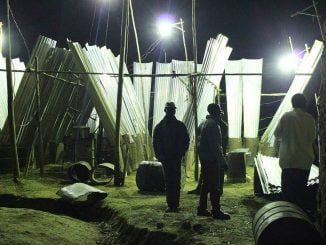
Kampala, Uganda | By Michael Wandati | Seasonal edible grasshoppers, also known as Nsenene, are a prized delicacy in Uganda, traditionally swarming in abundance during November, attracting many eager harvesters, sellers and consumers.
The Nsenene business, a vital source of income for many in Uganda, is facing a challenging season, prompting a closer examination of the environmental factors (climate change) contributing to this unexpected downturn.
Surprisingly, many people who collect or eat grasshoppers hardly know their origin, breeding, and migration patterns.
According to Dr. Chris Baryomunsi, the Minister of ICT and National Guidance, climate change is the key factor influencing this shift in the grasshoppers’ population dynamics. The unusually heavy rains experienced recently are believed to have disrupted the natural breeding cycle of Nsenene, leading to the observed reduction in their numbers. This disruption has created a ripple effect, impacting not only the livelihoods of traditional harvesters but also businesses that rely on a stable and abundant Nsenene supply.
The Minister’s acknowledgment of climate change as a significant player in this scenario underscores the broader, pervasive effects of environmental shifts on various sectors. To mitigate the adverse effects on businesses and communities dependent on Nsenene, Dr. Chris Baryomunsi suggests the importance of adopting proactive measures.
Furthermore, Dr. Baryomunsi advocates for increased investments in Information and Communication Technology (ICT) and technology. The rationale behind this recommendation is to enhance early identification of environmental changes and their potential impacts.
By utilizing advanced technologies, stakeholders can monitor weather patterns, breeding cycles, and ecological factors that influence the Nsenene population. This information, in turn, enables informed decision-making and the formulation of adaptive strategies to navigate the challenges posed by climate change.

The Minister’s call for technological intervention aligns with a broader vision of building resilience in the face of unpredictable environmental changes. Integrating ICT tools not only helps businesses and harvesters respond more effectively to current challenges but also positions them to anticipate and adapt to future shifts in the climate.
As Uganda grapples with the immediate repercussions of this year’s diminished Nsenene harvest, the emphasis on technological solutions emerges as a crucial element in building a more resilient and adaptive framework for the Nsenene business in the years to come.
The Nsenene business in Uganda: A cultural, economic, and environmental perspective
Nsenene, commonly known as grasshoppers, play a pivotal role in Uganda, both culturally and economically. Beyond being a seasonal delicacy, the Nsenene business represents a longstanding tradition that intertwines culinary practices, communal celebrations, and economic opportunities.
However, recent challenges, particularly those stemming from environmental shifts, have prompted a closer examination of the industry’s dynamics and its future outlook.
Cultural Significance
Culinary Tradition
Nsenene are a cherished part of Ugandan cuisine, often transformed into a delectable snack through deep-frying or sautéing with spices and salt.

The consumption of Nsenene is not merely a culinary choice but a cultural tradition that adds vibrancy to local dishes.
Seasonal Celebration
The arrival of Nsenene swarms marks a seasonal celebration, fostering a sense of community. Families and friends engage in communal harvesting and cooking rituals, turning the event into a social and cultural experience.
Economic Importance
Livelihood for Harvesters
In many rural areas, Nsenene harvesting is a significant source of income. Communities eagerly anticipate the swarming season to collect these insects in large quantities for sale in local markets.
Commercial Trade
The Nsenene trade extends beyond local markets, with businesses involved in processing, packaging, and distributing these edible insects to various regions within Uganda and neighboring countries.
Challenges and Opportunities
Environmental Sensitivity
The Nsenene business is highly sensitive to environmental conditions, with factors such as climate change impacting the abundance and availability of these insects.

Sustainable harvesting practices and ecological conservation are increasingly critical.
Market Dynamics
While Nsenene are a popular delicacy, market dynamics, consumer preferences, and economic conditions can influence the demand and pricing of these edible insects. The industry must adapt to changing consumer trends and economic landscapes.
Government Involvement and Regulation
Quality and Safety Standards
Recognizing the importance of the Nsenene business, regulatory bodies may be involved in setting guidelines to ensure the quality and safety of these edible insects for consumers.
Research and Development
Government agencies, research institutions, and non-governmental organizations may invest in research and development initiatives related to sustainable harvesting practices, ecological conservation, and the integration of technology in the Nsenene business.
Read Also: Two traders charged for vending grasshoppers aboard Uganda Airlines
Future Outlook
Adaptation to Climate Change
The recent impact of climate change on the Nsenene business underscores the need for adaptive strategies. Stakeholders must explore technological interventions and sustainable practices to mitigate environmental challenges.
Culinary Innovation
There is potential for culinary innovation and diversification of Nsenene-based products to cater to evolving consumer preferences, creating new market opportunities and ensuring the resilience of the industry.
In conclusion, the Nsenene business in Uganda is not merely about the consumption of a culinary delicacy but represents a complex interplay of culture, economics, and environmental dynamics.
As the industry faces challenges and opportunities, a holistic approach involving community engagement, technological advancements, and sustainable practices is essential to secure the longevity and vibrancy of this unique and culturally significant sector.



